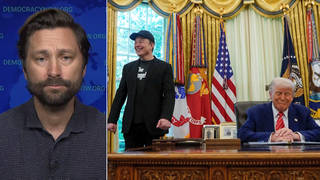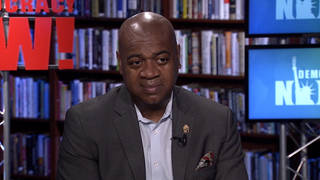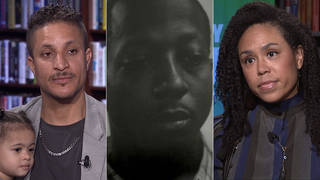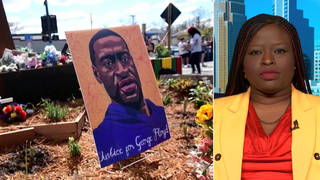
Guests
- Jonathan Arthurattorney for U.S. Army 2nd Lieutenant Caron Nazario.
We speak with the lawyer for a lieutenant in the Army Medical Corps who is suing two Virginia police officers who pepper-sprayed him, pushed him to the ground and pointed their guns at him during a traffic stop at a gas station last December. Video of the encounter has gone viral and shows Caron Nazario, who is a Black and Latino man, was wearing his Army uniform during the stop. When Nazario says he’s afraid to get out of his car, one officer responds, “You should be.” Nazario says he drove about a mile to the gas station after he noticed a police car flashing its lights at him — a common practice to avoid pulling over on a dark road. It is shocking that a police officer “felt it appropriate to threaten a man with state-sanctioned murder” for simply asking why he was pulled over, says Jonathan Arthur, Nazario’s attorney. “My client’s looking just to hold these officers accountable under law.”
Transcript
AMY GOODMAN: This is Democracy Now!, democracynow.org, _The Quarantine Report. I’m Amy Goodman.
A warning to our audience: The following story contains graphic descriptions and images of police violence.
We now turn to Virginia, where a lieutenant in the Army Medical Corps is suing two police officers who pepper-sprayed him, pushed him to the ground, pointed their guns at him during a traffic stop at a gas station last December. Lieutenant Caron Nazario, who is a Black Latinx man, was wearing his Army uniform at the time. Nazario says he drove to the gas station to avoid pulling over on a dark road after he noticed a police car flashing its lights at him, so that he could be somewhere public and well lit while he interacted with them. Video of the attack in the town of Windsor, Virginia, has sparked outrage.
JOE GUTIERREZ: Keep your hands outside the window!
LT. CARON NAZARIO: My hands are right here. What’s going on?
JOE GUTIERREZ: Get out of the car now!
DANIEL CROCKER: Get out of the car!
JOE GUTIERREZ: Now!
LT. CARON NAZARIO: What’s going on?
DANIEL CROCKER: Get out the car!
JOE GUTIERREZ: Get out of the car now! Get out of the car now!
LT. CARON NAZARIO: I’m serving this country, and this is how I’m treated?
JOE GUTIERREZ: You know what? Guess what. I’m a veteran, too. I learned how to obey!
LT. CARON NAZARIO: That’s —
JOE GUTIERREZ: Get out of the car!
LT. CARON NAZARIO: What’s going on?
JOE GUTIERREZ: Get out of the car now!
LT. CARON NAZARIO: What’s going on?
JOE GUTIERREZ: What’s going on? You’re fixin’ to ride the lightning, son.
LT. CARON NAZARIO: I’m sorry. What?
JOE GUTIERREZ: Get out of the car now!
LT. CARON NAZARIO: What’s going on?
JOE GUTIERREZ: Get out of the car now! Get out of the car!
DANIEL CROCKER: Sir, just get out the car. Work with us, and we’ll talk to you. Get out the car.
JOE GUTIERREZ: You received an order. Obey it!
LT. CARON NAZARIO: I’m — I’m honestly afraid to get out. Can I ask you what’s going —
JOE GUTIERREZ: Yeah, you should be! Get out!
LT. CARON NAZARIO: What’s going on?
JOE GUTIERREZ: Get out!
LT. CARON NAZARIO: What did I do?
DANIEL CROCKER: Get out the car.
JOE GUTIERREZ: Get out now!
LT. CARON NAZARIO: I have not committed any crimes.
JOE GUTIERREZ: You’re being stopped for a traffic violation. You’re not cooperating. At this point right now you’re under arrest for —
LT. CARON NAZARIO: For a traffic —
JOE GUTIERREZ: You’re being detained, OK? You’re being detained for obstruction of justice.
LT. CARON NAZARIO: For a traffic violation, I do not have to be out the vehicle.
JOE GUTIERREZ: Really?
LT. CARON NAZARIO: You haven’t even told me why I’m being stopped.
JOE GUTIERREZ: Really?
LT. CARON NAZARIO: Get your hands —
JOE GUTIERREZ: Get out! Get out of the car now! Get out of the car!
LT. CARON NAZARIO: Get your hands off of me, please.
JOE GUTIERREZ: Get out.
LT. CARON NAZARIO: Get your hands off me.
JOE GUTIERREZ: You know what?
LT. CARON NAZARIO: Get your hands off me.
JOE GUTIERREZ: Not a problem.
LT. CARON NAZARIO: Get your hands off me.
JOE GUTIERREZ: Back up, Daniel.
LT. CARON NAZARIO: I didn’t do anything. Don’t do that.
DANIEL CROCKER: Sir!
JOE GUTIERREZ: Get out of the car now!
LT. CARON NAZARIO: Don’t do that.
DANIEL CROCKER: Hey! Stop.
LT. CARON NAZARIO: Don’t do that.
JOE GUTIERREZ: Get out of the car now!
DANIEL CROCKER: Sir, look.
LT. CARON NAZARIO: Don’t do — I’m trying to talk to you.
JOE GUTIERREZ: Get out!
DANIEL CROCKER: OK.
LT. CARON NAZARIO: I’m trying to talk to you.
DANIEL CROCKER: I’m going to talk to you.
JOE GUTIERREZ: Get out!
DANIEL CROCKER: Just get out of the car.
LT. CARON NAZARIO: Relax. Can you please relax?
JOE GUTIERREZ: Get out!
LT. CARON NAZARIO: Can you please relax?
JOE GUTIERREZ: Get out of the car right now! Now!
LT. CARON NAZARIO: This is not how you treat a vet. I’m actively serving this country, and this is how you’re going to treat me?
JOE GUTIERREZ: Back up, Daniel.
LT. CARON NAZARIO: I didn’t do anything.
JOE GUTIERREZ: I got him.
LT. CARON NAZARIO: Whoa! Hold on! What’s going — hold on. Watch it.
DANIEL CROCKER: [inaudible] deployed.
JOE GUTIERREZ: Get out of the car! Get out of the car now!
LT. CARON NAZARIO: That’s [bleep] up. That’s [bleep] up.
JOE GUTIERREZ: Get out of the car now!
DANIEL CROCKER: Sir, just get out of the car!
LT. CARON NAZARIO: I’m trying to breathe.
JOE GUTIERREZ: Get out of the car now!
LT. CARON NAZARIO: That’s [bleep] up. That’s really [bleep] up.
JOE GUTIERREZ: Get — open — get out of the car and get on the ground now, or you’re going to get it again!
LT. CARON NAZARIO: I don’t even want to reach for my seat belt.
AMY GOODMAN: What our radio audience might not be able to see is he’s getting pepper-sprayed at point-blank range by the officer. Lieutenant Caron Nazario was then forced to the ground and handcuffed. The officer who deployed the pepper spray, Joe Gutierrez, was fired last week, days after the public video of the — the release of the video was public, but nearly four months after the actual incident. Virginia Governor Ralph Northam said he’s directing the State Police to conduct an investigation.
We go now to Richmond, Virginia, where we’re joined by Jonathan Arthur, attorney for U.S. Army 2nd Lieutenant Caron Nazario.
Can you explain how this happened? Can you explain why they stopped him, and that terrifying comment that this police officer made? As the lieutenant was saying, “What did I do wrong?” he said, “You’re fixin’ to ride the lightning”?
JONATHAN ARTHUR: It’s incredible, isn’t it, Amy — and thank you for having me — that in response to a calm question, “Hey, what did I do wrong?” one of our law enforcement felt it appropriate to threaten the man with, you know, state-sanctioned murder. And that particular expression, “ride the lightning,” is colloquial for being electrocuted in the electric chair, what Virginia called “Old Sparky.” And there’s an even more grotesque layer to that statement when you take a look at the way that the death penalty has been disproportionately applied to African Americans and people of color in Virginia and in the South. It’s a terrifying statement, especially when you’re facing the barrel of a gun, and especially because you have been pulled over ostensibly because one of the officers said you didn’t have a license plate, which was, in fact, factually false.
AMY GOODMAN: In fact, he had just bought this car, is that right? It had dark tinted windows, and the license was in the window?
JONATHAN ARTHUR: Yes, the dealer where he purchased the vehicle had placed the temporary tag in the back upper right-hand corner of his — the rear window. And, you know, one of the maddening things is when you take a look at both of these officers’ video — excuse me, body-worn cameras. You know, before they’re obscured by the officers’ firearms, the body-worn cameras picks up the presence of this license plate. The officer that initiated this traffic stop ultimately says, “Yeah, you know, I saw it when I got out of my video — when I got out of my car, but I was too busy dealing with you.” It belies belief.
AMY GOODMAN: And you have the lieutenant saying, “I’m afraid of police.” And he said, “You should be”?
JONATHAN ARTHUR: Yeah. So, you know, after having to deal with these inconsistent commands — right? — officer saying, “Keep your hands out of the window,” another officer saying, you know, “Get out of the vehicle,” and you can’t do the same thing — you can’t do both of those at the same time. To say, “Hey, I’m scared to get out of this vehicle,” well, a reasonable person should have been, like, “Well, let’s see what we can do to deescalate this situation.” But that’s precisely the opposite of what the town of Windsor and its police force did. Instead of deescalating, Joe Gutierrez says, “Yeah,” confirmed, after having threatened to murder my client, that my client should be afraid to get out of the vehicle. That’s wholly unacceptable. The man has no business being in law enforcement.
AMY GOODMAN: And explain how this actually first went down. You have Lieutenant Nazario seeing the police lights but afraid to pull over on a dark road, so drives slowly —
JONATHAN ARTHUR: Right.
AMY GOODMAN: — for what? Another minute, until he finds a well-lit area, which is a gas station, then pulls over.
JONATHAN ARTHUR: That’s correct. And, you know, one of the really, really troubling statements in this whole interaction — and there’s a few of them we can talk about — is Joe Gutierrez saying, “Hey, you know, I knew what you were doing. I knew you were pulling over to a well-lit place for officer safety and for my safety and for yours. It happens all the time.” And, you know, I think he says 80% of the time it’s a minority. And that may inform some of his behaviors that we find so baffling.
AMY GOODMAN: Amazingly, The Washington Post reports that Caron Nazario’s wife Raquel is a cousin of Eric Garner. Eric Garner, of course, the African American man who was killed by police in 2014 — put him in a chokehold, took him down — video of the arrest went viral — as he said, 11 times, “I can’t breathe.” Caron Nazario called Garner his uncle?
JONATHAN ARTHUR: You know, lightning is not supposed to strike twice — right? — in the same location, in the same place. And I think it’s a testament to how brutal and how violent our police is — our police are, when this type of violence occurs twice to the same family in two different states hundreds of miles apart. I think it lays bare some of the systemic problems that America is facing with how our police interact with the people they’re trying to protect — they’re supposed to be protecting.
AMY GOODMAN: So, Lieutenant Nazario was wearing his uniform. He even said he was afraid to release his seat belt, because he’d have to reach down, and that could be an excuse for the police.
JONATHAN ARTHUR: That’s correct. What would have happened — you know, I think he was forced to — which one of those two officers he was going to listen to. Did he keep his hands out of the vehicle so everyone could see it, or did he move them down so he could see his seat belt? And luckily, I think he picked the right officer to comply with, to keep the hands out of the window, because, you know, from looking at how these two officers behaved, with their guns pointed at his head, it’s not unreasonable to think that had my client tried to comply and taken his seat belt off, that they would have murdered him right there at the BP in Windsor over a traffic stop.
AMY GOODMAN: So, you’ve filed a $1 million lawsuit on behalf of the lieutenant. What are you calling for, in addition?
JONATHAN ARTHUR: So, you know, there’s a couple of — the overriding purpose of this lawsuit is to put a stop to this behavior, however we have to do it. You know, we fight with the tools that we are given. So, my client is looking just to hold these officers accountable under law and for you to stop this behavior. So, we’re seeking for the federal court to say, “Hey, you know, this behavior was illegal.”
And there’s some things that are even, I think, more troubling from a constitutional standpoint than the violence. And that’s both of these officers then threatening to destroy my client’s career if he speaks out on the issue. So, we’re trying to get — we’re asking the federal court to declare those actions illegal and unconstitutional. We want a jury to say the same thing, so we can write this in legal stone and we can use it as further precedent down the road so that others can hold other officers accountable, because they will not stop this behavior unless there is accountability — until there is accountability.
And finally, there are the monetary damages. Now, the law says that my client is entitled to be compensated for the damages that he suffered — right? — for the attack, for the pepper spray, for the constitutionally shattering actions of these officers. And the law also says that the jury can award exemplary damages. And this is to make an example out of the conduct, to punish the conduct, to keep the conduct from happening again. And if we can’t get these law enforcement officers to change on their own, then another way to do it is to make it so expensive for these municipalities, moving forward, to continue operating as they are, that will bankrupt them or force them to change their behavior. So, everything we’re doing here is to stop —
AMY GOODMAN: Well, Jonathan Arthur, I want to thank you for being with us, attorney for U.S. Army 2nd Lieutenant Caron Nazario, who, I should say, was in his uniform. He has sued two Virginia police officers who pepper-sprayed him, pushed him to the ground, pointed their guns at him, threatened him during a traffic stop in December.
Next up, a New York court vindicates an African American Buffalo police officer who was punched in the face, then fired and stripped of her pension, for trying to stop a white cop from choking a handcuffed Black man. Stay with us.













Media Options